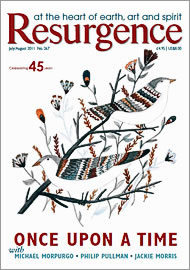In all of the intense and pervasive debate on climate change over the past decade or so, there has been a prevailing air of perplexity and confusion, which has worsened as we draw nearer to the perceived point of no return. And the truth is that we still have no real grip on how to orient ourselves towards this decisive confrontation between our industrial-technological ambitions and the finitude of the Earth’s capacity to provide.
Ever starker warnings issue forth from the scientific community and concerned individuals, who all feel they are in a losing race against time to avert a catastrophe of cosmic proportions. Yet the industrial behemoth marches on, carbon emissions still increase, forests are still cut down and we appear to have finally run out of ideas (and inner resources) from which to fabricate a constructive response.
Dianne Dumanoski’s book stands out from this landscape of confusion. Unflinching in her acknowledgment of the gravity of the situation now facing us – and the assertion that we must relinquish the false hope of ‘averting climate change’, for we have already imposed irreversible disruption on the global climate system and there is no plausible route to restoring its former stability – she moves beyond that sobering conclusion to confront the vital question: “What kind of human presence do we now need to bring into being in order to survive and flourish in a world that can no longer accommodate the type of industrial civilisation that has precipitated the crisis?”
Dumanoski is to be congratulated on bringing to the task of rethinking our orientation to the challenge of climate disruption an impressive combination of scientific awareness, cultural and philosophical insight and literary skill. This is an exceedingly well-written book, as well as an exceedingly well-informed one, which I believe (and hope) will prove a very influential one too.
The most important service Dumanoski has rendered is to have shown that the dominant idea of the present phase of human history – that of the continuous improvement of human life through unlimited expansion of industrial production and ever greater control of Nature – is no longer compatible with a viable mode of existence for humans within the limits of the global ecosystem.
It follows that, rather than seeking ever more fantastic technical means to preserve this dream, we must reconnect with our evolutionary roots and return to a more modest, but ultimately far more satisfying, mode of being that emphasises adaptability and resilience in relating to the natural world, rather than seeking power and control over it.
Dumanoski finds in the human evolutionary story a source of what she calls ‘honest hope’; she urges us to absorb the significance of the fact that for millions of years, humans have successfully survived repeated and indeed dramatic shifts in climatic and environmental conditions due to their qualities of adaptability and resilience. But in the drive to maximise economic efficiency and productivity, we have also abandoned many of the structural features of our socio-economic arrangements that are conducive to resilience, thus making ourselves ever more vulnerable to the impacts arising from the disruption of natural systems. And this must now change.
This hyper-efficient, but hyper-fragile, production system is guaranteed to fail dramatically under conditions of severe climate change, and the great god of technological innovation will not be able to save it.
Dumanoski devotes a chapter to the misplaced hope of a ‘technofix’ approach to climate change, demonstrating that massive physical intervention, such as mirrors in space or carbon capture, risks either causing yet more damaging side-effects or merely postponing the evil day when the fundamental conflict between industrial expansion and the complex equilibria that maintain the global ecosystem reaches breaking point.
Technofix approaches treat climate change as an isolated symptom when in fact it is just one manifestation of a deep systemic problem that cannot be addressed without change to the underlying dynamic and motivation of the industrial economy. Such a shift in consciousness will require a sustained effort to educate leaders in all fields of human activity – politics, business, the arts, science, culture, philosophy and even religion.
I am profoundly grateful to Dianne Dumanoski for writing this book, and I commend it as an indispensable contribution to our understanding of our current dilemma.







